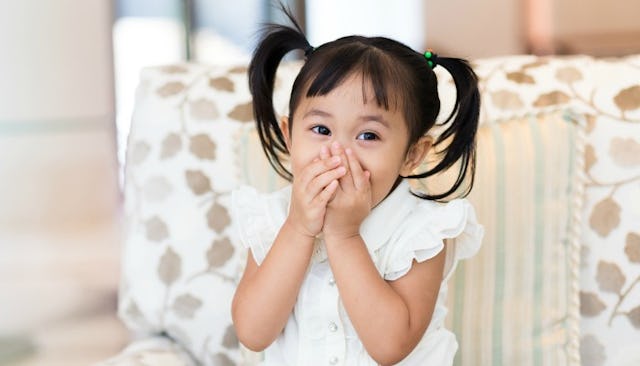When Your Preschooler Swears

My 4-year-old and I are chatting in the bank drive-thru lane, musing as to what flavor sucker she’ll get today. And then it happens: The tube returns, containing nothing but a bank receipt. The dreaded “empty bank tube.” Cue foreboding music.
“Uh-oh, Sophie, it looks like the lady forgot to put the sucker in,” I tentatively inform my preschooler. “What a bummer! We’ll have to get one next time,” I add, keeping my tone light.
The seconds tick by in slow motion. My daughter is silent. And then…
“Dammit!” she yells, throwing her pad of paper and pencils to the floor of our minivan.
I am grateful she cannot see my face. Because let’s be honest, it’s kind of funny. Not to mention the fact that there’s a certain degree of pride in knowing that my tiny daughter has mastered the appropriate use of that particular expletive. If bank-sucker disappointment doesn’t call for a “dammit,” I don’t know what does.
I give her a small lecture about how that’s a grown-up word that children aren’t allowed to say. I share some other options for words we can blurt out in frustration, words like “rats” and “shucks” and other things I would never say in real life.
I think the talk goes well.
Later that day, my 9-year-old informs me that her little sister was attempting to ask Siri a question on the iPad, and the request was met with the always-vexing response of “I’m afraid I can’t take any questions right now.” My wee inquisitor then slammed the uncooperative tablet onto the couch and unleashed a hearty “dammit!”
I mean, again, props for correct context, but it appears my words of guidance had failed to sink in five hours earlier. We were in trouble.
Several days later, my 4-year-old casually asked if the Broncos won the game. Regrettably, I informed her they had not.
“Oh, bammit!” she exclaimed, eyeing me carefully. Clearly, she had found the perfect loophole.
This brief phase was sadly not our first brush with profanity. When my pint-sized potty-mouth was 2, she went through an F-word stage. As with “dammit,” she always executed this expletive with impeccable context and nuance. Dropping her snack bowl all over the kitchen floor, she would demur with a quiet, “Ohhhh, fuck.”
I took the children on a road trip to visit family over spring break, praying daily that my youngest child wouldn’t stub her toe and say “Ohhhh, fuck” in front of 92-year-old Grandma Myrtle.
At first I tried not to respond when she unleashed the F-bombs; I’d read numerous articles advising me not to let it become a power struggle or something she knew was a hot button for me. So I ignored it whenever she said it—until she let loose at childcare one day. Fortunately, unlike lice or croup, her swearing didn’t have the same herpes-like effect amongst her companions, and I didn’t receive any angry phone calls from parents of newly cussing toddlers. But I had to gently tell her that she wasn’t allowed to say “Ohhh, fuck” anymore. She stopped eventually.
Her older sister, being the quintessential firstborn rule-follower, didn’t dabble in cursing with the same enthusiasm. All it took was one episode to shut down the whole sailor talk operation for good.
“Mommy,” she said one day when she was about 4½ years old, “can you help me find my pink pants?”
We headed down to the laundry room where I peered into the washing machine to find her favorite pants wet and unwearable.
“Sorry, honey,” I called to my daughter, who was standing behind me in the hallway. “They’re still wet!”
“Well,” my oldest child cheerfully responded, “I guess I’ll just have to wait ’til fuckin’ morning!”
I stuck my head inside the washing machine, shaking with laughter and thankful my back was turned. I paused briefly.
“What did you say?” I asked casually, keeping all emotion from my voice. My daughter didn’t miss a beat.
“I guess I’ll just have to wait ’til crummy morning!” she swiftly adapted.
And that was the end of her swearing career.
But here’s the thing: I don’t think swearing is that big of a deal. The jig is up—my kids obviously heard those choice gems from me, their mother. There is nobody else to blame for exposing them to profanity. While I don’t walk around the house good-naturedly musing about “fuckin’ morning” to my kids, I have been known to drop a regular “dammit” when burning bagels, misplacing shoes, and spilling milk. And seriously, what else are you supposed to say besides, “Oh, fuck” when you miss the school bus?
I try not to swear unnecessarily around my kids—I really do. But shielding them from the F-word is not my primary goal as a parent. Hell, it’s not even in the top 100. Because again, I just don’t think bad words are that big of a deal. They’re going to hear them. They’ll learn to use them. They will discover how and when, and at what age they are allowed to casually drop their first swear in front of adults. They’re going to turn out to be fantastic people (furiously knocking on wood here) regardless of their tendencies to cuss.
And who knows? Maybe they’ll be put off by their mother’s fondness for the F-word and go another direction with their expressive language. As it is, my preschooler won’t let a single person get away with uttering the worst of all words under any circumstances: stupid. She even tattles on TV characters who say it. My kids both know that the real bad words—stupid, hate, shut up, fat, ugly and dumb—the ones that have the potential to hurt others, are off-limits in our house. The occasional frustrated “dammit” uttered from a kind-hearted, loving child? I can live with that.